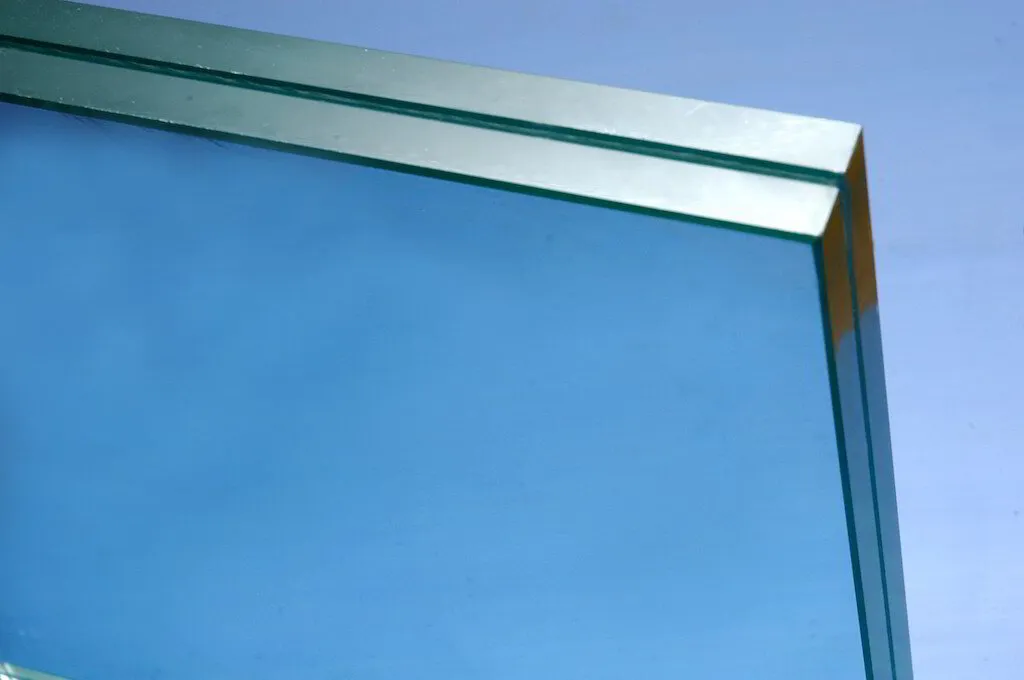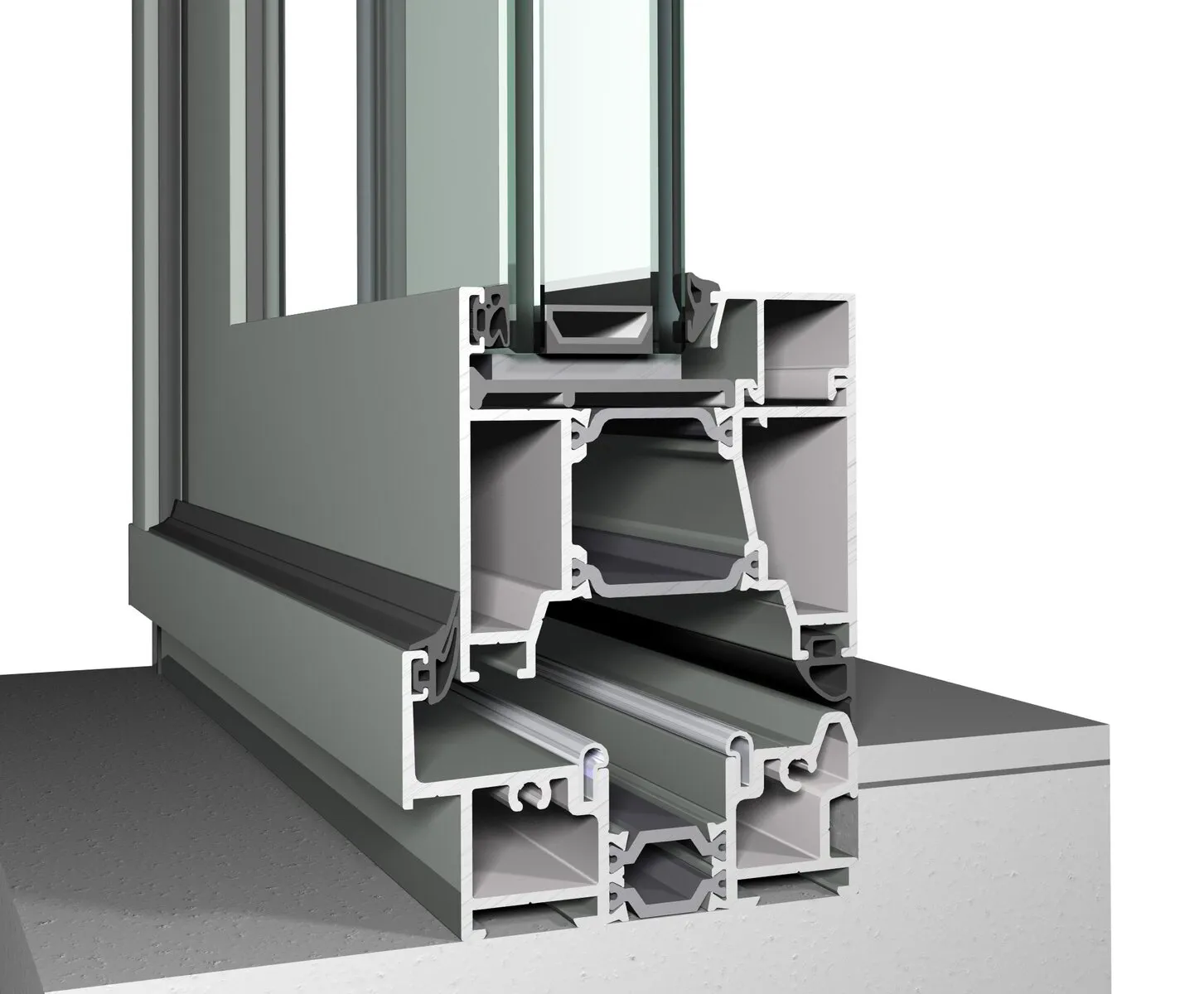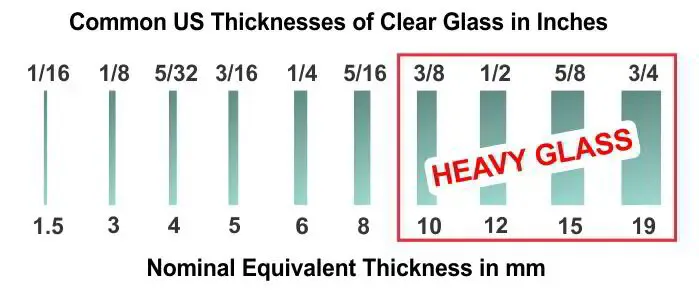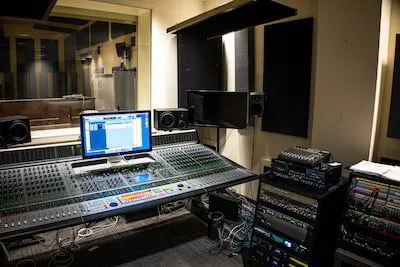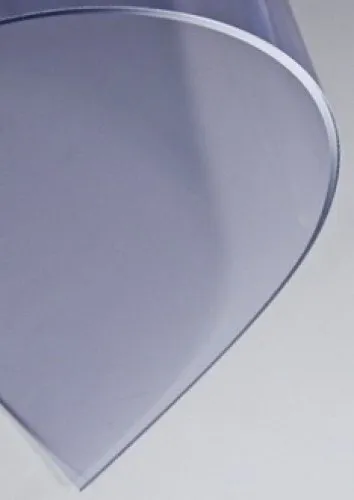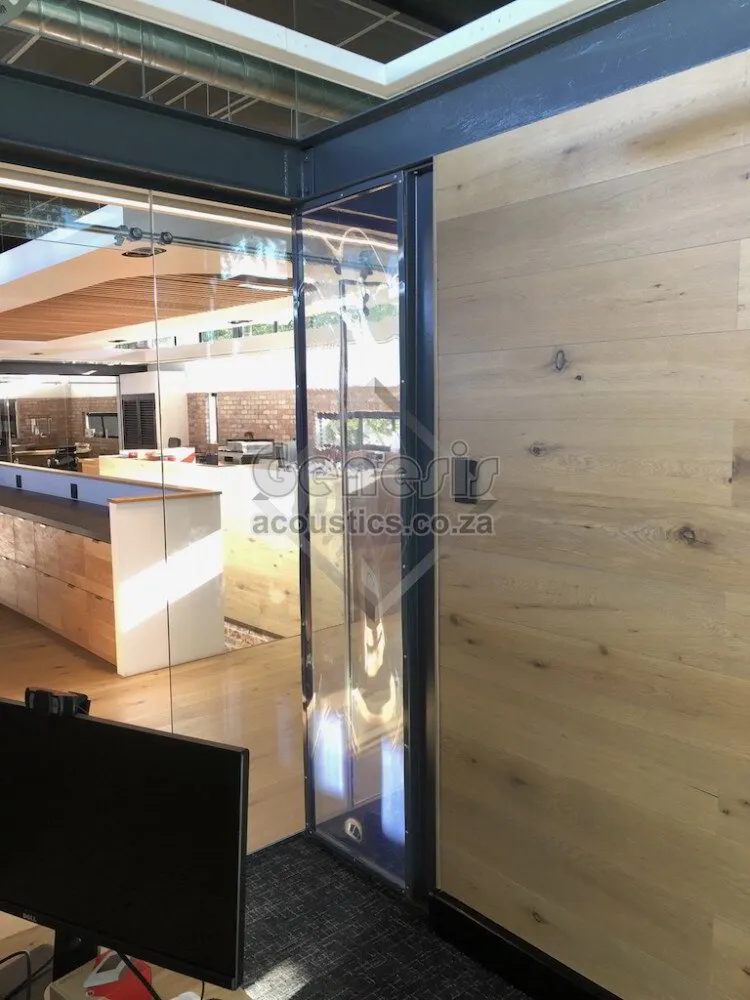Ultimate Guide to Soundproof Glassfor Your Home & Office
Article written by Brett Robinson the owner of Genesis Acoustics, 1st May 2023
Fact checked by Steven Kartapanis, who studied acoustics at the Berklee College of Music
Soundproofing your home or office is possible with the strategic use of soundproof glass, in the key areas where noise problems may occur. This comprehensive guide will walk you through everything you need to know about the types of soundproof glass available, the benefits it offers & the installation process.
For those of you who need a solution for existing windows, I have also included a bonus section about our clear, noise reduction window blinds that can easily be retrofit. CNB provides noise control without blocking visibility or natural light and is available ex-stock from our Johannesburg warehouse.
We service the whole of South Africa with our soundproof glass and CNB solutions. We deliver to Johannesburg, Pretoria, Cape Town, Port Elizabeth, Durban and every other major business centre and town.
Table of Contents
13. Links
1. Understanding Soundproof Glass: How It Works
Soundproof glass, also known as acoustic glass, is specifically designed to reduce the transmission of noise between the interior and exterior of a building or between adjacent interior rooms which are separated by glass panels. It achieves this by incorporating multiple layers of glass with varying thicknesses and an internal laminate. Air gaps filled with specialised gases or a vacuum can also be used to further improve the acoustic performance. These systems & components work together to minimise sound transmission by reducing structural resonance.
2. Types of Soundproof Glass
There are several types of soundproof glass available on the market, each with its unique properties and applications:
- Laminated Glass: Composed of two or more layers of glass bonded together with a special interlayer (typically polyvinyl butyral or ethylene-vinyl acetate). The interlayer helps to dissipate sound waves thereby reducing noise transmission.
- Insulated Glass Units (IGUs): Consist of two or more panes of glass separated by a spacer, which creates an air or gas-filled cavity. The cavity provides insulation, while the different glass thicknesses disrupt sound waves, reducing noise transmission.
- Acoustic Grade Glass: Specifically engineered for superior sound insulation, this type of glass incorporates advanced technologies such as specially designed interlayers to increase the sound insulation properties.
3. Thickness of the Soundproof Glass
Laminated Soundproof Glass
A high-quality soundproof glass product has thickness determined by the following:
- Multiple Layers: The presence of multiple glass layers with varying thicknesses and interlayers helps to break up and attenuate sound waves more effectively. The cumulative thickness of the laminated glass usually ranges between 6.38mm - 8,76mm thick.
- Air or Gas-Filled Cavity: A well-designed air or gas-filled cavity within the glass unit significantly contributes to sound insulation. The size of the spacer ranges between 4mm - 16mm.
- Overall thickness: The thickness of the glass coupled with the spacer means you could have an overall thickness of between 16mm - 34mm thick or possibly even more.
Glass panes with an air gap in between
What Thickness is Best for Homeowners?
Single pane: In our experience, purely from an acoustic standpoint most homeowners will be satisfied with a single pane of 8,76mm thick, which is enough to cut out most common neighbourhood sounds. Yes, it could always be better but at what cost? In terms of soundproofing for homeowners it's a balance of budget vs performance. Soundproofing windows should factor in what degree of acoustic insulation will provide sufficient acoustic comfort most of the time, taking into consideration noise levels common to the area.
Contact us
Need help with your project? We're here to chat and get things moving in the right direction.
4. STC Rating Explained
The STC rating system (Sound Transmission Class) is a way to measure how good structural elements such as walls, windows, doors etc. are at blocking sound. You can read all about soundproof doors here
Imagine you're in a room, and there's loud music playing outside. If the walls have a high STC rating, you won't hear the music as much because the walls are good at stopping the sound from coming in. On the other hand, if the walls have a low STC rating, you'll probably hear the music more clearly, because the walls aren't as good at blocking the sound. So, the higher the STC rating, the better the material is at keeping noise out or in, making your space quieter and more comfortable.
Examples of STC Rated Building Structures
When soundproofing structures such as windows, doors, walls etc. it's helpful to be able to compare the STC rating to known structures, for ease of reference.
- Typical hollow drywall: STC 31
- Plastered single brick wall: STC 40
- Plastered double brick cavity wall: STC 52
STC Rating of Panes of Glass
The following are estimates of single panes - no airspace:
- 3mm Clearvue STC 23
- 6mm Clearvue STC 28
- 6.38mm IntruderPrufe STC 33
- 6.76mm Soundprufe HPR STC 34
- 8.76mm Soundprufe HPR 38
Much higher STC ratings can be achieved by using multiple layers of glass with airspaces.
Chat to us here to learn more.
Contact us
Need help with your project? We're here to chat and get things moving in the right direction.
5. Benefits of Installing Soundproof Glass
Soundproofing windows in your home or office provides several advantages:
- Reduced Noise Pollution: Soundproof glass effectively blocks out unwanted noise from traffic, construction, and other external sources, creating a quieter and more comfortable environment.
- Improved Privacy: It not only keeps outside noise from entering but also prevents sounds from within your space from escaping, ensuring greater privacy.
- Increased Energy Efficiency: Options that include an airspace also offer excellent thermal insulation, helping to reduce the energy consumption required for the heating / cooling of the room.
6. Selecting the Right Soundproof Glass for Your Space
Soundproof glass panel in a recording studio
between the control room and live room
Choosing the right specification depends on several factors, including the level of noise reduction desired, budget, and specific requirements of your space.
Consider the following when making your selection:
- Assess Your Noise Reduction Needs: Determine the level of noise reduction required by identifying the primary sources of noise and the desired level of quietness in your space.
- Know the Options: Familiarize yourself with the different types of soundproof glass available and their respective STC ratings to understand which options may be best suited for your needs.
- Consider Additional Features: If you require extra features, such as thermal insulation or UV protection, look for options that include these elements.
- Consult a Professional: Seek the advice of an experienced soundproofing specialist to help you make an informed decision. You can send us an enquiry here
Contact us
Need help with your project? We're here to chat and get things moving in the right direction.
7. Installation Process & Tips
Proper installation is crucial for maximising the acoustic performance.
Here are 4 essential tips to ensure a successful installation:
- Hire a Professional: Engage a qualified and experienced professional to handle the installation, as improper installation can compromise the effectiveness of the solution. We hear stories every day about failed installations, however we're here to make sure that you succeed. You can get in touch with us here
- Inspect the Frames: Check the window or door frames for gaps that may allow sound to leak through.
- Seal Gaps and Cracks: Use high-quality acoustic sealants to seal any gaps or cracks around the frames to further enhance sound insulation.
- Ensure Airtightness: Verify that the seals and gaskets around the glass unit are airtight, as this is crucial for maintaining the soundproofing performance over time.
8. Maintenance & Cleaning
Soundproof glass helps to block common sounds
like traffic noise and wind noise
Follow these tips to keep your soundproof glass in top condition:
- Clean Regularly: Wipe the glass surfaces with a soft, lint-free cloth and a mild glass cleaner. Avoid using abrasive cleaning agents or tools that may scratch the glass.
- Inspect Seals and Gaskets: Periodically check the seals and gaskets around the glass unit for signs of wear or damage and replace them as necessary.
- Lubricate Moving Parts: If your soundproof glass is part of a window or door system, lubricate the moving parts periodically to ensure smooth operation and prevent wear.
9. Cost Considerations
The cost of soundproof glass will vary depending on factors such as the type, thickness, STC rating and any additional features. While higher-quality soundproof glass may come with a higher price tag, the long-term benefits, such as improved acoustic comfort and energy efficiency, can outweigh the initial investment.
To make an informed decision, factor in the costs of delivery & installation. Don't forget to weigh the cost against the anticipated benefits to determine the most suitable option for your space.
Contact us
Need help with your project? We're here to chat and get things moving in the right direction.
10. Soundproofing Existing Windows with Clear Noise Barrier (CNB)
If you are in a situation where you already have existing windows through which disturbing noise is bothering you, then you may want a quick fix and rather avoid breaking out your old window frames to install new ones. This is especially true as many older frames simply cannot accommodate thicker glass.
Genesis Acoustics are the importer and sole stockists of CNB, which helps solve this very problem. CNB is especially useful because it may not be pragmatic for you to install new soundproof windows.
What is Clear Noise Barrier (CNB)?
CNB is a clear, limp, flexible, mass loaded vinyl.
Due to these structural characteristics CNB is able to efficiently absorb sound energy and therefore attenuate sound transmission.
It is hung in front of the window like a blind. It can be installed in a few different ways depending on your unique situation & budget.
4 Reasons Why Retrofitting CNB Can Make a Lot of Sense:
- You are renting the home or flat and can't make structural changes
- You are a tenant in the office space and don't want to invest in glass which will stay behind when your lease is up and you leave.
- Maybe you already have soundproof glass but you want to make further improvements to the noise levels?
- Your existing window frames cannot accommodate thicker glass - this is often the case.
Clear noise barrier has been applied
over the existing glass panes in this office
4 Methods of Installing CNB
- Fixed directly to the door or window frame.
- Static hanging blind
- Single sliding rail
- Double sliding rail
Check out our product page here to see the demo video and for more information.
1st Pic: CNB being installed directly onto the the frames of the stacking doors.
2nd Pic: Completed installation. Note that the CNB covers the hollow frames of the stacking doors.
3rd Pic: CNB hung on a sliding rail, in front of large glass panes in a flat.
Conclusion
Soundproof glass offers a practical and effective solution for enhancing acoustic comfort in your home or office. By understanding the different types of soundproof glass, the benefits and the installation process, you can make an informed decision to create a quieter, more comfortable space.
Don't let noise pollution disrupt your life any longer. Take action today - you can get in touch with us here
Our team of experts will help you choose and install the soundproof glass solution that is best suited to your specific needs. Experience the benefits of a peaceful home or office.
Contact us
Need help with your project? We're here to chat and get things moving in the right direction.
FAQ's
What is soundproof glass?
Soundproof glass, also known as acoustic glass or noise-reducing glass, is a type of glass that is designed to reduce the amount of external noise that enters a building or room. It typically consists of two or more panes of glass that are separated by a layer of air or gas, with additional sound-absorbing materials such as laminates or films applied to the surface of the glass.
Soundproof glass works by reducing the amount of sound energy that can pass through the glass, thereby reducing the overall level of noise that enters the space. This can be particularly beneficial in urban areas or near busy highways, where external noise levels can be high and disruptive to daily life. Soundproof glass can be used in a variety of applications, including windows, doors, partitions, and walls.
How do I know if my windows are soundproof?
The best option is to have a professional come and do an assessment on site. Although the windows may be a problem there are often other sound paths which must also be identified and taken into consideration. This wholistic approach will give you a more accurate indication of what needs to be done to block out the disturbing noises.
As general rule of thumb, any glass pane which is only 3-4mm thick will provide very, very little sound attenuation and 3-4mm thick glass is the most common thickness installed in homes.
Do soundproof windows really work?
Yes, soundproof windows can be effective at reducing the amount of noise that enters a room. Soundproof windows are designed to block out external noise by using special glass and insulation to create a barrier between the inside and outside of the building.
The amount of noise reduction you can expect from soundproof windows will depend on factors such as the thickness of the glass, the type of insulation used, and the design of the window frame.
Keep in mind that while soundproof windows can be effective, they may not completely eliminate all noise, especially if there are other sources of noise in the room or building. If you are considering installing soundproof windows in your home or office, it is important to work with a reputable company that specializes in this type of window installation to ensure that you get the best possible results.
Brett Robinson Bio
Brett Robinson is a well-known figure in South Africa, in the field of acoustics and soundproofing, with a career spanning over two decades. As an entrepreneur, blogger, public speaker, husband, and father of three, Brett has balanced his professional pursuits with a rich personal life. He founded and has been managing Genesis Acoustics since 1997, leading the company in designing and manufacturing innovative acoustic solutions such as soundproof doors, generator enclosures, and various sound-absorbing room finishes.
His expertise and commitment to quality have earned him the trust of some of South Africa's biggest companies, including Barloworld, Mercedes Benz East London Plant, Durr, Ford Motor Company South Africa, Volkswagen South Africa, Nissan, 3M, Coca Cola Bottling Plant Port Elizabeth, banks, Starbucks, Mugg & Bean and many more. His impact extends beyond large corporations to churches, recording studios, and numerous small to medium-sized businesses.
Brett leads a dedicated team of over a dozen full-time staff, with Genesis Acoustics represented in various major centres across South Africa. His contributions to the industry have not only shaped the soundscapes of countless architectual spaces but have also set a high standard for acoustic and soundproofing solutions nationwide.
When not working in one of his companies, Brett enjoys spending time with his family, writing, mountain biking, and training in Krav Maga. His diverse interests and commitments reflect his dynamic approach to life and work, embodying a holistic vision of success that values both professional achievement and personal fulfilment.
Links
https://www.instagram.com/genesis_acoustics
https://www.facebook.com/GenesisAcousticsRSA
https://www.soundproofmygenerator.co.za/
https://what3words.com/definite.major.bubbles
The National Institute of Building Sciences - Acoustics: https://www.nibs.org/page/acoustics
The Glass Association of North America (GANA): https://www.glasswebsite.com/
The International Noise Control Engineering (INCE-USA): https://www.inceusa.org/
Sound and Vibration Magazine: https://www.sandv.com/
U.S. Green Building Council (USGBC) - LEED Rating System: https://www.usgbc.org/leed


